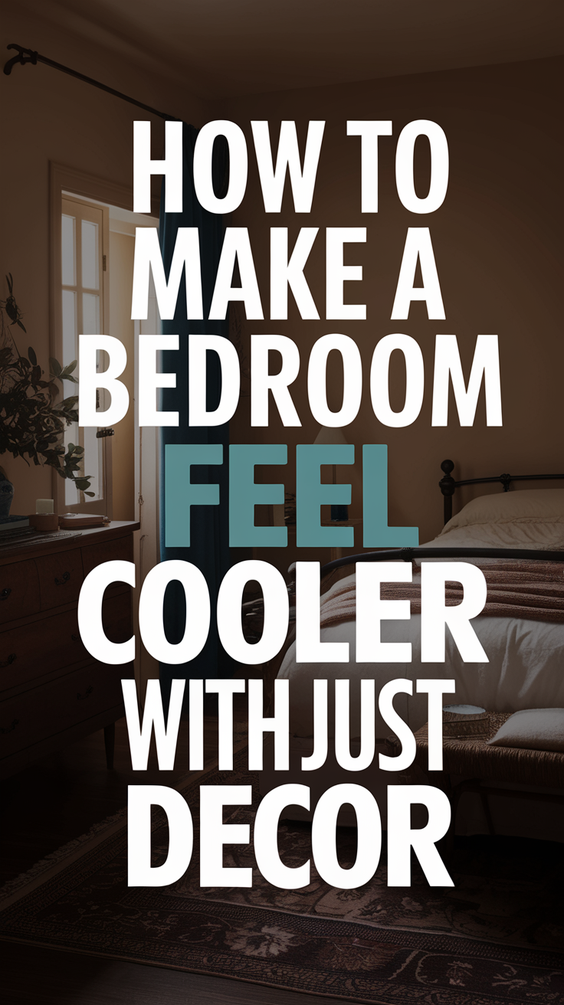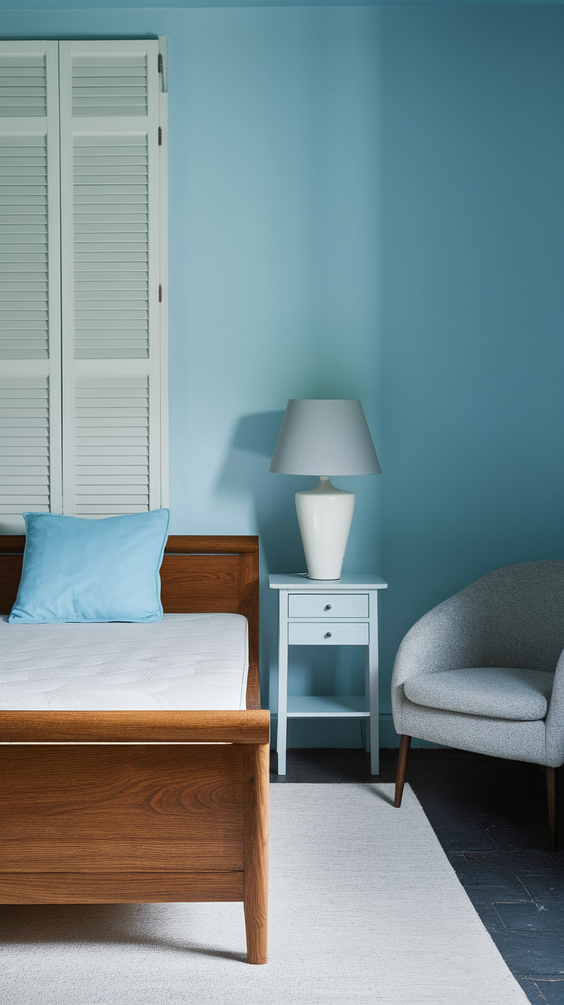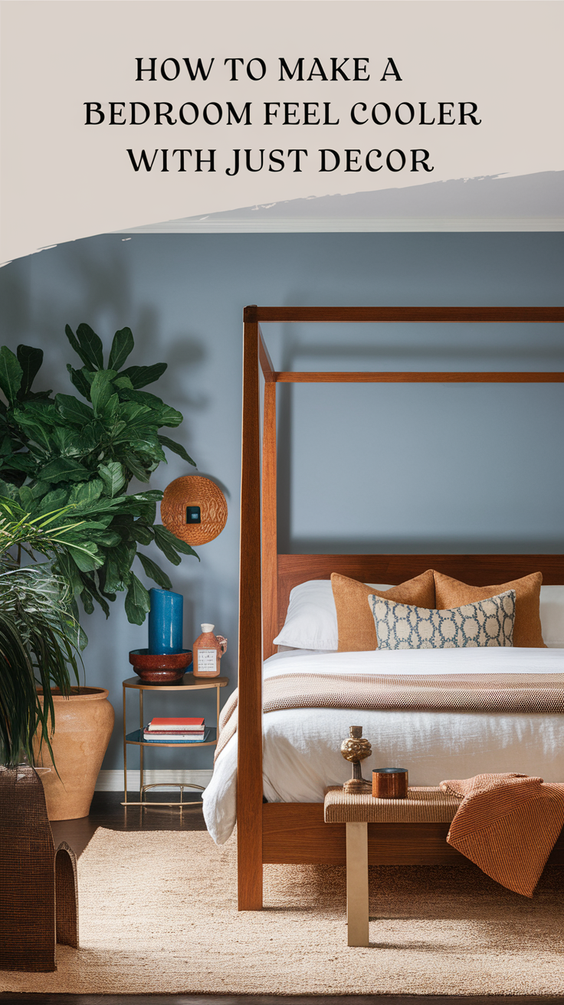Why Your Bedroom Might Be Too Hot—And How Decor Can Help
Did you know that sleep experts recommend a bedroom temperature of 60–67°F for optimal rest? Yet in 2025, many homes—especially rentals or older buildings—don’t offer central air, and running a fan all night can be noisy and inefficient.

So how do you make your bedroom feel cooler without touching the thermostat? Surprisingly, thoughtful decor choices can shift not just temperature perception, but comfort, airflow, and ambiance too.
In this guide, you’ll discover how to transform your space into a cooler retreat using nothing but visual and tactile design changes. From light fabrics and calming colors to strategic furniture placement, we’ll cover the easiest and most affordable tricks.
Who is this article for?
This is for renters, homeowners without AC, minimalist lovers, hot sleepers, and anyone who wants their room to feel as fresh as it looks.
The Science Behind Cooling Decor
Decor can’t lower the temperature in your room—but it can change the way your body and mind perceive it. Cool tones, airy textures, reflective surfaces, and breathable fabrics work together to create a fresher, lighter atmosphere that physically feels more tolerable on hot days.
This concept is grounded in psychology and sensory response: humans associate certain colors and patterns with warmth or cold, and that visual association affects how we experience temperature.
Pro Tip: Use decor to influence light reflection, airflow, and moisture balance—three elements that dramatically impact how “hot” or “cool” a space feels.
Color Choice: The First Step Toward a Cooler Room
Go for Pale Blues, Greens, and Soft Neutrals
Cool colors like sky blue, mint green, pale gray, and sandy beige visually open up a space and evoke a sense of breeze and shade. Avoid reds, oranges, and mustard tones, which subconsciously increase the perception of warmth.

| Shade | Psychological Effect | Best Use |
|---|---|---|
| Ice Blue | Calming, cool | Bedding, walls |
| Mint | Refreshing, airy | Curtains, pillowcases |
| White Sand | Clean, breathable | Area rug, wall art |
Use Color Blocking Strategically
Try painting one wall a cooler shade and keeping the others white or light neutral. This creates depth and opens up visual space, which reduces feelings of heat and crowding.
Choose Breathable Fabrics and Lightweight Textures
Swap Out Heavy Materials for Natural Fibers
Trade out velvet, polyester, or microfiber bedding for linen, cotton, and muslin. These materials wick away moisture and promote air circulation, unlike synthetic blends that trap heat.
Cooling Fabric Comparison Table
| Fabric | Breathability | Best for |
|---|---|---|
| Linen | Excellent | Sheets, throws |
| Cotton (Percale) | Very good | Duvet covers, curtains |
| Bamboo | Good | Pillowcases, sleepwear |
Ditch the Excess Layers
Limit the number of pillows and blankets on your bed. A minimalist approach doesn’t just feel cooler—it looks cooler too.
Quick Fix: Try a lightweight summer quilt instead of your usual comforter. It’s a small switch that makes a big difference.
Let There Be (Cool) Light
Choose Lighting That Doesn’t Add Heat
Incandescent bulbs emit more heat than LED alternatives. Replace all bedside and ceiling lights with cool white LED bulbs for a cleaner, more ambient glow.
Rethink Your Lampshades and Fixtures
Use glass, rattan, or open metal frames instead of fabric-covered lampshades, which trap heat and dust. Reflective surfaces bounce light around, increasing brightness without warmth.
Create Airflow Through Smart Furniture Layout
Declutter for Better Circulation
A crowded room traps hot air. Your bed area should have open pathways and wall-distance furniture placement to enable cross-ventilation. This is especially useful if you have windows on opposite sides of the room.
Avoid Upholstered Headboards and Bulky Bed Frames
Wooden or metal frames retain less heat than tufted or plush options. Consider a platform bed or minimalist frame with room underneath for airflow.
Use Greenery for a Natural Cool Down
Houseplants That Promote Cooler Air
Plants naturally regulate humidity and can cool the air slightly through transpiration. Great options include:
Aloe Vera – low maintenance and cooling
Snake Plant – purifies air and survives low light
Areca Palm – elegant and tropical
| Plant | Cooling Effect | Ideal Spot |
|---|---|---|
| Aloe Vera | Medium | Windowsill |
| Snake Plant | Low | Corner of room |
| Areca Palm | High | Beside bed |
Plant Placement Matters
Put plants near windows to enhance the “breezy” visual effect. Too many in one spot can make the space feel dense, so scatter them for a light, airy feel.
Add Reflective or Light-Amplifying Surfaces
Use Mirrors to Multiply Light and Space
Strategically placed mirrors opposite a window can double the natural light in your bedroom and make it feel brighter—and therefore cooler.
Glass, Acrylic, and Pale Wood Accents
Furniture made from lighter materials gives the room a sense of openness. Choose translucent nightstands, pale birch dressers, or even metallic trays for an elevated cool touch.
Seasonal Swaps That Make a Big Impact
When the seasons change, so should your decor. Here’s a quick list of summer decor swaps:
| Item to Swap | Replace With |
|---|---|
| Heavy blackout drapes | Sheer white curtains |
| Faux fur throw | Waffle-knit cotton blanket |
| Dark accent pillows | Linen pillows in cool tones |
| Carpeted rug | Flatweave or jute rug |
Did you notice? Cooler decor doesn’t have to mean stark or boring—it can still be textured and stylish.
Bonus Sensory Tricks: Cool Through Scent and Sound
A Cool Room Feels Cooler
Light up an eucalyptus or mint-scented candle, or use a diffuser with essential oils like lavender, rosemary, or lemon. These scents are scientifically shown to lower perceived temperature and stress.
Play Cooling Sounds
A soft white noise machine or sound of water can psychologically help you feel like you’re near a breeze or lake.
Trending Bedroom Decor Styles That Feel Fresh in 2025
Scandi Cool
Natural light
Pale wood and white walls
Simple shapes and zero clutter
H3: Boho Light
Linen canopies
Macrame hangings in muted tones
Woven baskets and planters
Earth-Toned Minimalism
Bare floors
Wall-mounted lights
Stone-inspired palettes
Budget-Friendly Cooling Decor Tips
Want all of the effect without a huge cost? Try these ideas:
Swap throw pillow covers ($10–15 each on Amazon)
Add a large plant from Home Depot or IKEA (~$30–50)
Change out heavy curtains for white sheers (~$20/panel)
Replace duvet cover with linen-look set (~$60–80)
Rearrange furniture for airflow (free!)
It’s not about how much you spend—it’s how smart you spend it.
Quick Checklist: Your Cool Decor Action Plan
| Task | Purpose | Tip |
|---|---|---|
| Swap heavy bedding | Reduces heat retention | Use percale or linen |
| Add mirror across window | Multiplies light | Use full-length vertical mirror |
| Repaint in cool tone | Calms the space | Sky blue or mint green |
| Add 1–2 plants | Regulates humidity | Choose low-maintenance options |
| Declutter surfaces | Opens airflow | Start with nightstand |
Final Thoughts: Small Decor Changes, Big Comfort Gains
Even without AC, you can create a cooler-feeling bedroom by using decor tricks backed by psychology and design. From breathable bedding and cool-toned color schemes to smart lighting and airflow optimization—every detail adds up.
So, where will you start—will it be a fabric refresh, a mirror move, or some potted plants?
Tell us in the comments: what’s your go-to trick for staying cool at night?
And don’t forget to share this guide if it gave you a fresh idea!

